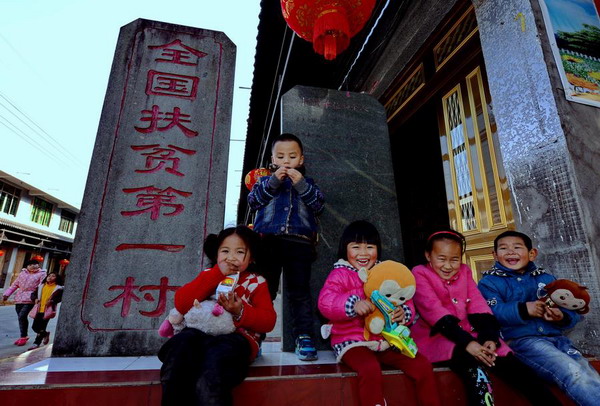Nobel Prize can spur efforts to fight poverty
China Daily by Zhu Qiwen, October 15, 2015 Adjust font size:
 |
|
Children of Se ethnic group sit in front of a monument that reads "China's No. 1 Poverty Relief Village" at Chixi Village, Panxi town, Fuding city in East China’s Fujian province, Feb 14. The village has shaken off poverty thanks to assistance from Party and government officials at all levels over the past 30 years. [Photo/Xinhua] |
This year's Nobel Prize for economics has gone to a pioneering poverty expert. That arguably represents both high praise and a push for the global efforts to eliminate extreme poverty, a goal that the winner isn't "blindly optimistic" about.
For representatives who will attend the Global Poverty Reduction and Development Forum in Beijing on Friday to share their experience in combating poverty, it pays to have a close look at how Angus Deaton, a British-born economist at Princeton University, has deepened understanding about poverty at the very basic level.
In a year when the global poverty rate is set to fall below 10 percent for first time, such a top prize for an economist who has spent decades studying what determines poverty and how people make their consumption decisions could certainly amount to a pat on the back for all those who have long engaged in the hard war against poverty.
Even though the international poverty line is being upgraded from the 2005 level of $1.25 a day to the current level of $1.9 a day, the number of people living in extreme poverty is likely to fall from 902 million people or 12.8 percent of the global population in 2012 to 702 million people, or 9.6 percent of the global population this year, according to a forecast released by the World Bank early this month.
However, as the 23rd International Day for the Eradication of Poverty is observed on Saturday, it is worth policymakers taking time to learn from Deaton's analysis of what drives people's shopping habits and how governments can better target economic development.
Deaton's work is definitely not meant to offer a panacea for poverty reduction around the world. But his pioneering effort seems more than needed for a country such as China that aims to both reduce the number of people living below poverty line by a million a month in coming years and boost domestic consumption into a turbocharged growth engine for its economy that ranks the second-largest in the world.
China has contributed hugely to the global progress in poverty relief. It was the first developing country to meet the Millennium Development Goal target of reducing the poverty population by half ahead of the 2015 deadline. About 439 million people in China have been lifted out of poverty since China's reform and opening-up.
But, at the end of last year, more than 70 million people in the countryside still lived below the country's poverty line of an annual income of 2,300 yuan ($363). That is why poverty relief remains a top priority for China, and why it aims to eliminate such extreme poverty by 2020.
The protracted global slowdown since the onset of the global financial crisis in 2008 will surely add to the difficulties China and other developing countries face in their efforts to end poverty, especially as the yawning gap between the rich and the poor has tended to expand as the flood of cheap money has disproportionately enriched the 1 percent around the globe. According to the Credit Suisse on Tuesday, China has become the second richest country with household wealth standing at $22.8 trillion, which is good news but also a worrying sign if the trend of widening wealth gap is not arrested.
To cement its remarkable progress in poverty relief will require China to not only spend aggressively on public transfer, education and health for the poor, but also to boost effectively consumption-led growth to generate sufficient income-earning opportunities.
Deaton's work has been praised for illustrating how individual behavior affects a broader economy and for creating tools for governments to study how families adjust spending in response to policy changes.
To accelerate the country's economic transformation toward consumption-driven growth, Chinese policymakers should not hesitate to draw on the research achievements of the Nobel economist.